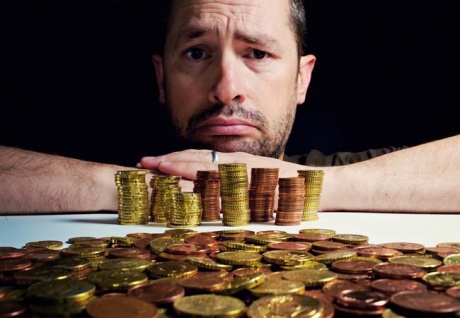
The Beatles taught me that money can't buy me love. What else can't money buy me?
Michael: Alm... these days almost nothing. Money can buy more and more these days and that's a question I think we need to debate: what should be the role of money in markets in our society?
Interviewer: Well, in the book you talk about using a Bruce Springsteen concert as an example of how sometimes the market doesn't work, there are other reasons why people maybe shouldn't pay a full price for a ticket. Can you explain that to me?
Michael: Right, well, Springsteen prices his concerts below the market level because he wants to keep faith with his working class fans and have a certain spirit in the hall and of course then there are ticket scalpers, this gives rise to ticket scalping*. But when is ticket scalping okay and when isn't it? What about if there's a long line** as there are outside Chinese hospitals to see a doctor.
People wait days in line. There are ticket scalpers who scalp tickets to see the doctor. That's more troubling it seems than the Springsteen concert. Line standing companies on Capitol Hill: lobbyists want to go in to sit on congressional hearings, they don't want to stand in the line [so] they hire line standing companies who hire the homeless to wait for them. Should... should Congress charge the market rate for access or should it let the ticket scalping go on? These are questions that I think we need to debate. They raise bigger questions about what money should buy and what it shouldn't.
Interviewer: Alright, so what kind of a role should the free market play? In the book you talk about keeping the market in its place. What kind of place should that be?
Michael: Right. Well in the er... over the last three decades we've drifted without quite realising... realising it from having a market economy to becoming a market society. And the difference is this: a market economy is a tool, a valuable and effective tool for organising productive activity, but a market society is a place where everything is up for sale: education, health, citizenship even, personal relations, so the question we need to debate, I think, is where markets serve the public good and where they don't belong.
Interviewer: Well, where is it someone else's er.. problem to tell me what I can't buy or what I want to buy. Why is it your view that if I don't want to... that I shouldn't pay 500 dollars for a Springsteen ticket, why is it your view that I should only pay a hundred?
Michael: Well, I don't have a view about how much you should spend on a Springsteen ticket but take this example: votes. Half the people in the country don't even use their vote in the Presidential election. Why shouldn't they be free to sell their vote to the highest bidder? There are people out there, we know, who would like to buy those votes but why do we tell people that they can't sell their vote if they want to?
It's because there are other goods: in the case of voting, civic goods, civic duty, civic virtue that we as a society think er... should not be put on the auction block. There are many ways that money and markets are reaching into spheres of life traditionally governed by other goods and what I am saying is we need to step back and debate as a society where do markets belong and where are other values at stake that we care about and want to protect.
Some say we should put the right to emigrate up for sale rather than have these messy debates about who should be able to come, who should get to the head of the line. We need to ask ourselves hard questions about where markets really do serve the public good, that's the case after all for the capitalist system, and where market values may crowd out other values worth caring about.
* In British English we say ticket touting, the people are ticket touts.
** In British English we say a queue or to queue not a line or to wait in line.